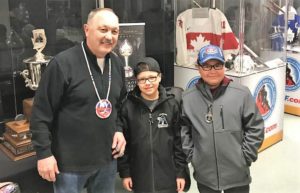Former NHL greats meet with LNHL players

One of 100 Greatest NHL Players, Bryan Trottier met with young fans at the Little NHL’s Meet and Greet session on March 13. Photo courtesy of: Brenden Biedermann.
By Sam Laskaris
MISSISSAUGA – A seven-time Stanley Cup champion dropped by the Little Native Hockey League tournament on Tuesday.
Bryan Trottier, arguably the best Indigenous player to make it to the National Hockey League, averaged well more than a point per game during his 18-season pro career.
Trottier, who won the NHL championship six times as a player and once more as a coach, was at the Iceland facility in Mississauga to take part in a Meet and Greet session, which also included a number of other former Indigenous NHLers.
The Meet and Greet session was held in conjunction with the youth tournament, better known as the Little NHL.
A record 209 teams from across Ontario are participating in the 47th annual tournament, which began Monday and continues until Thursday.
Trottier, a Métis who was born in Val Marie, Sask., now lives in Pittsburgh. He had captured back-to-back Stanley Cup titles with the Pittsburgh Penguins in 1991 and ’92.
Trottier, who is now 61, had also won four consecutive league championships with the New York Islanders from 1980-83.
His seventh championship came in 2001, while serving as an assistant coach with the Colorado Avalanche.
Other Indigenous former pros who attended Tuesday’s session were Reggie Leach, Stan Jonathan, Fred Sasakamoose and Jonathan Cheechoo, the honorary chair of this year’s tournament.
Cheechoo is a member of the Moose Cree First Nation, which is in its second year of hosting the Little NHL.
Trottier was thrilled he was among those invited to come to meet tournament participants as well as their family members and friends, both young and old.
“We look at it as a wonderful honour,” he said. “We had the opportunity to play hockey at the highest level. To come back and share stories with people is awesome.”
Trottier is hoping he can inspire others to possibly go on and fulfill their dreams of playing pro hockey.
“Our path to the NHL was not easy,” he said. “We had to go to those tournaments just like this one.”
Trottier doesn’t just try to inspire Indigenous people around hockey rinks. In recent years he’s travelled to about 200 Indigenous communities, primarily across Canada. Sometimes those trips will include participating in charity hockey games.
“It’s wonderful to get into the communities and see the challenges they face,” Trottier said.
And Trottier also has a rather simple message for all youngsters.
“I encourage all kids—boys and girls—to get their education and to play sports,” he said. “If they do that, good things will happen.”
During his pro career, Trottier appeared in exactly 1,500 NHL contests. He racked up 1,609 points, including 595 goals.
Trottier’s successes earned him an induction into the Hockey Hall of Fame in 1997, the first year he was eligible.
Officials from Toronto-based hall were also present at Tuesday’s session and brought with them four major NHL awards.
This included the Hart Trophy, annually awarded to the NHL’s top player. Trottier won that award for his efforts during the 1978-79 campaign, when he had a career high 134 points in 76 games.
The other trophies on display were the Maurice “Rocket” Richard Trophy, the Conn Smythe Trophy and the Jack Adams Award.
Cheechoo won the Maurice “Rocket” Richard Trophy following the 2005-06 season, when he had a league-high 56 goals.
Leach, who won the Stanley Cup in 1975 with the Philadelphia Flyers, captured the Conn Smythe Trophy in ’76 as Philly advanced to the league final again.
Ted Nolan, an Ojibwe who played and coached in the NHL, was also at Iceland facility yesterday. Nolan, who won the Jack Adams Award as the NHL’s best coach when he was with the Buffalo Sabres in 1996-97, was manning a booth for the 3 NOLANS, a First Nation hockey skills development camp he runs with his sons Jordan and Brandon.


